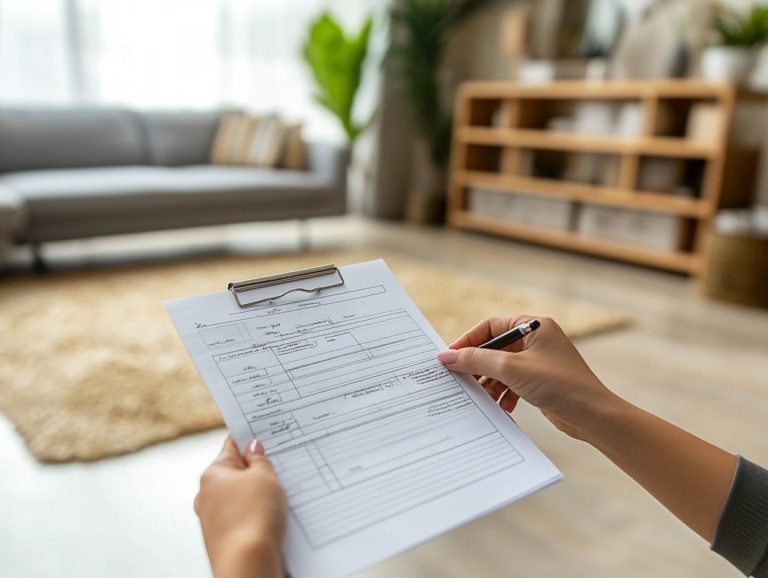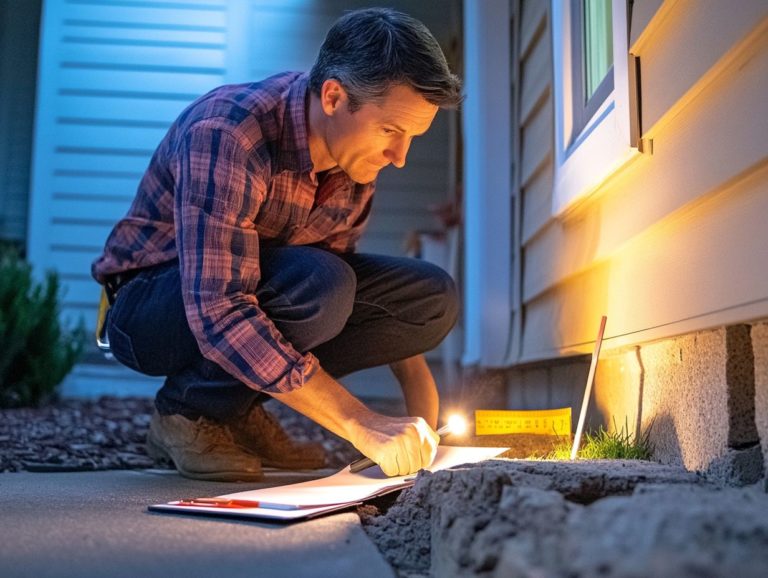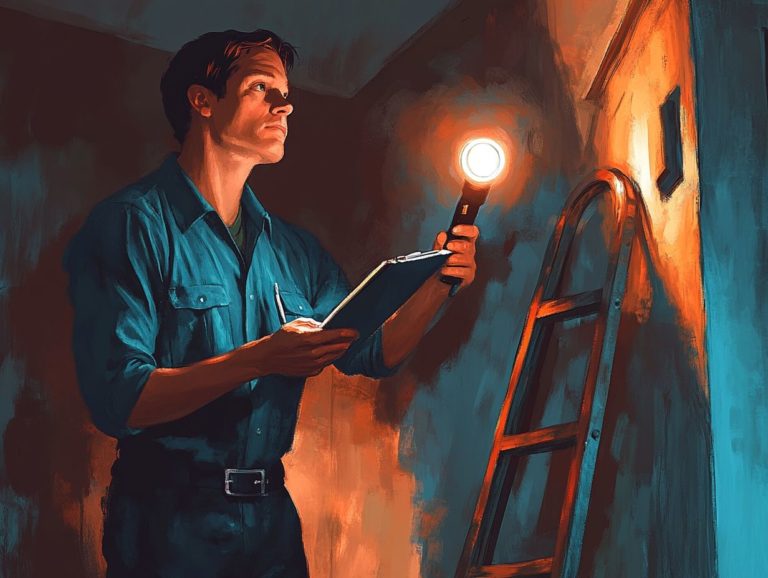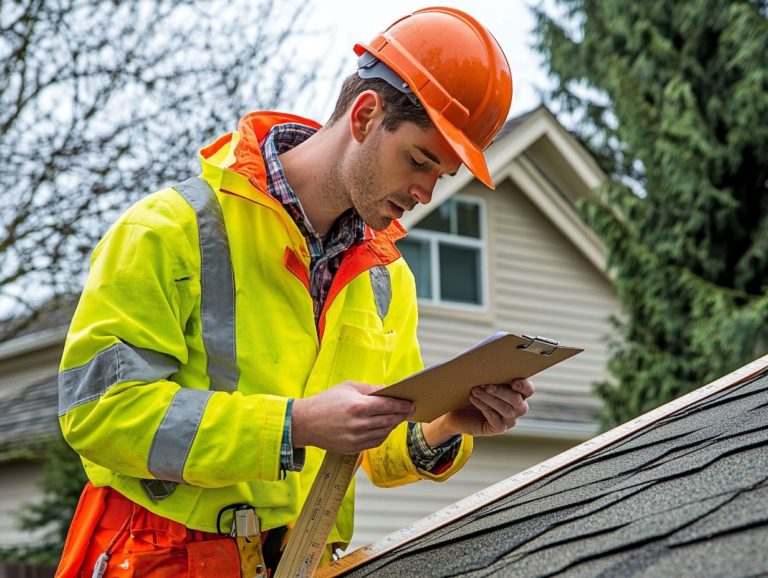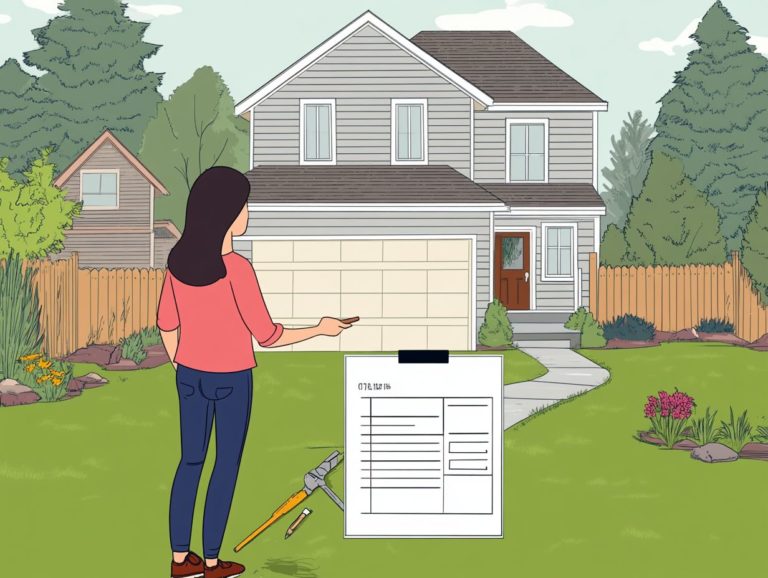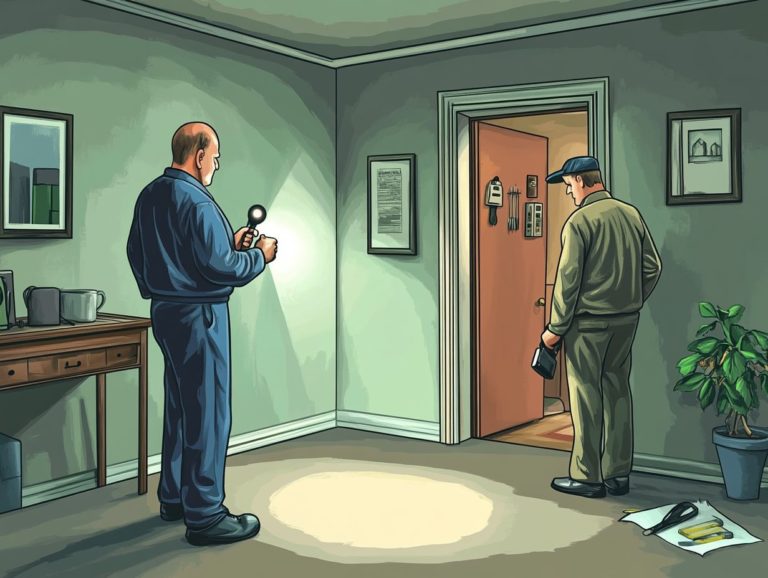Understanding the Process of Home Inspections
Purchasing a home stands as one of the most significant investments you ll ever undertake, and a home inspection is a vital part of that journey.
This guide delves into the purpose and importance of home inspections, outlining the step-by-step process that accompanies this essential evaluation. You ll gain insight into what an inspection entails, common issues to watch for, and valuable tips for choosing the right inspector.
By familiarizing yourself with this crucial process, you re setting the stage for a smoother, more informed home-buying experience.
Contents
Key Takeaways:
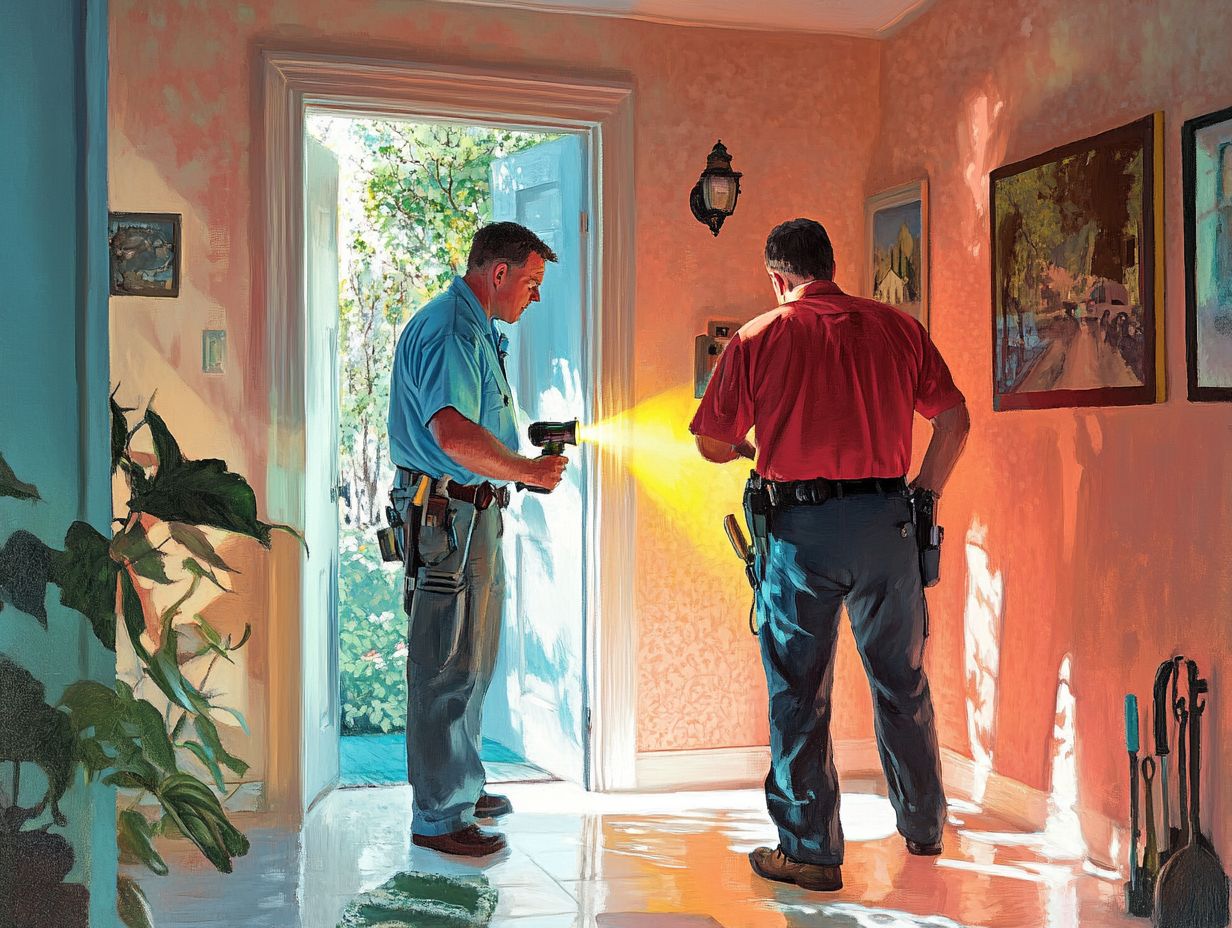
- A home inspection is a crucial step in the home-buying process.
- It provides a thorough evaluation of a property’s condition and potential issues.
- A comprehensive inspection covers the roof, plumbing, electrical, and HVAC systems, identifying potential red flags.
What is a Home Inspection?
A home inspection is an essential step in real estate transactions where a professional inspector evaluates the property for significant issues that could impact its market value and safety.
This process informs potential buyers about the property s condition while addressing the concerns of the home seller, ensuring both parties are aware of any serious problems that may be lurking beneath the surface.
The assessment typically covers various systems, including the roof, HVAC, plumbing, and electrical systems, leading to a detailed report about the home s condition.
Purpose and Importance
The purpose of a home inspection is to provide you with a thorough evaluation of a property, helping you seize valuable buyer opportunities. Understanding what to expect during a home inspection also allows sellers to address any issues before closing.
A comprehensive inspection is crucial in real estate, as it identifies significant safety concerns and potential financial pitfalls that could impact your decision. Understanding the true condition of the home enables you to make informed choices, leading to negotiations that accurately reflect the property’s worth.
Sellers benefit by proactively uncovering and rectifying any problems, enhancing their property’s appeal and market value. A smooth inspection process fosters trust between both parties, paving the way for a successful transaction.
The Home Inspection Process
The home inspection process serves as a comprehensive assessment of a property’s condition, meticulously conducted to unveil any significant issues that could affect its market value and safety. For more insights, consider understanding the role of agents in home inspections.
On inspection day, expect a thorough examination guided by a detailed checklist, ensuring no crucial detail slips through the cracks.
Step-by-Step Guide
A step-by-step guide to the home inspection process is your roadmap for understanding what to expect and how to prepare effectively for inspection day. To gain deeper insights, consider understanding the role of home inspectors, as this can ensure a smoother transaction and provide valuable insights into the property’s condition.
The journey begins when you schedule the inspection. It s wise for you, as a buyer, to book a qualified inspector early in your buying process to avoid delays. If you re a seller, proactively arranging for the inspection allows you to identify any major issues beforehand.
On inspection day, it s beneficial for both you and the buyer to be present, enabling immediate discussions about findings. During the inspection, various aspects of the property like the roof’s integrity, plumbing conditions, electrical systems, and overall structure will be rigorously assessed using a detailed checklist.
Prepare a list of questions to ask during the process, while sellers can tidy up and ensure easy access to different areas of the home.
After the inspection, the final report will outline any concerns, providing clarity and actionable steps for negotiation.
This is your chance to discover what could make or break your investment!
Don’t hesitate to book your home inspection today and ensure you make informed decisions in your home-buying journey.
What is Included in a Home Inspection
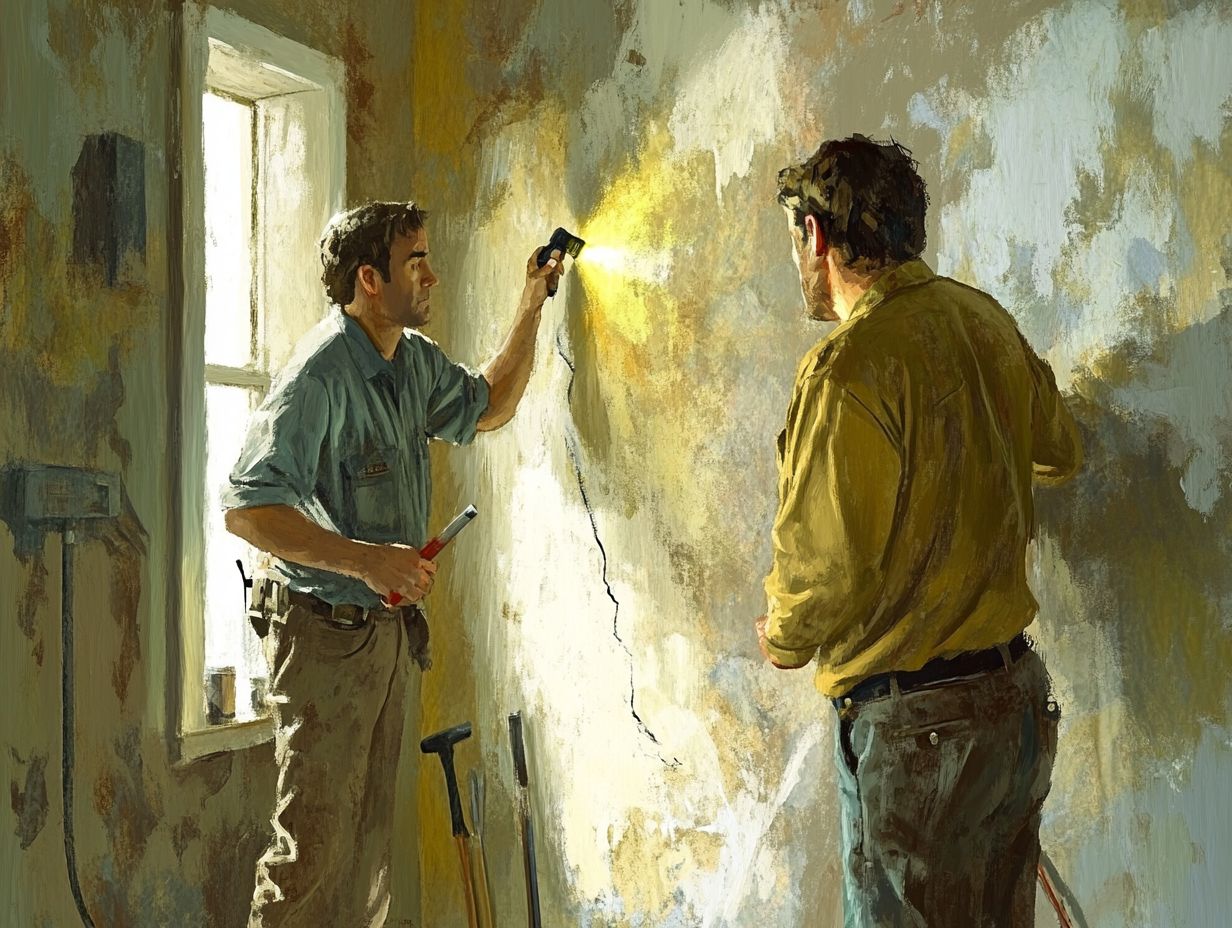
A comprehensive home inspection entails a meticulous evaluation of various areas and systems within the property. For those interested, understanding what to know about home inspection policies is crucial, as this process ensures that critical components are thoroughly assessed for any potential issues.
These components include the Heating, Ventilation, and Air Conditioning (HVAC) system, plumbing, electrical systems, and structural elements.
It’s about achieving peace of mind, knowing that every crucial aspect of your home has been carefully examined.
Areas and Systems Covered
Home inspections encompass vital areas and systems, including HVAC, plumbing, electrical systems, and the foundation. This ensures any hidden safety concerns are identified before you make your purchase.
Inspectors evaluate these components methodically. They check the HVAC system for efficiency, look for plumbing leaks, and assess the electrical system for safety hazards.
The foundation undergoes a thorough examination for cracks or signs of settling. These issues can escalate into serious structural problems.
For you as a buyer, understanding the condition of these systems gives you insight into potential future repair costs and can significantly influence your negotiations.
Sellers also stand to gain; by addressing potential issues in advance, they can alleviate buyer anxiety and enhance the property’s appeal. A home warranty can offer you peace of mind, covering specific repairs and mitigating the financial risks related to unforeseen issues.
Common Issues Found During Home Inspections
During home inspections, you may encounter common issues that could pose serious risks, such as mold, water damage, termite infestations, radon, asbestos, and lead piping.
These problems can drastically lower your property’s value and threaten your safety!
Identifying Red Flags
Identifying red flags during a home inspection is essential for both buyers and sellers. Serious issues like water damage and compromised structural components can lead to significant safety concerns in the future.
For example, if you notice signs of mold in the basement or peeling paint around windows, these could hint at hidden moisture problems that might require costly remediation.
On the flip side, if you’re selling, be on the lookout for cracks in the foundation or uneven floors. Such signs can indicate serious structural issues that may deter potential buyers.
These red flags not only impact immediate negotiations but may also require further inspections or expensive repairs, creating a ripple effect throughout the entire transaction process.
Choosing a Home Inspector
Choosing the right home inspector is key to a successful home inspection! This choice ensures that you, as a potential buyer, receive an accurate assessment of the property, enabling you to seize valuable opportunities that may arise in your home-buying journey.
Factors to Consider
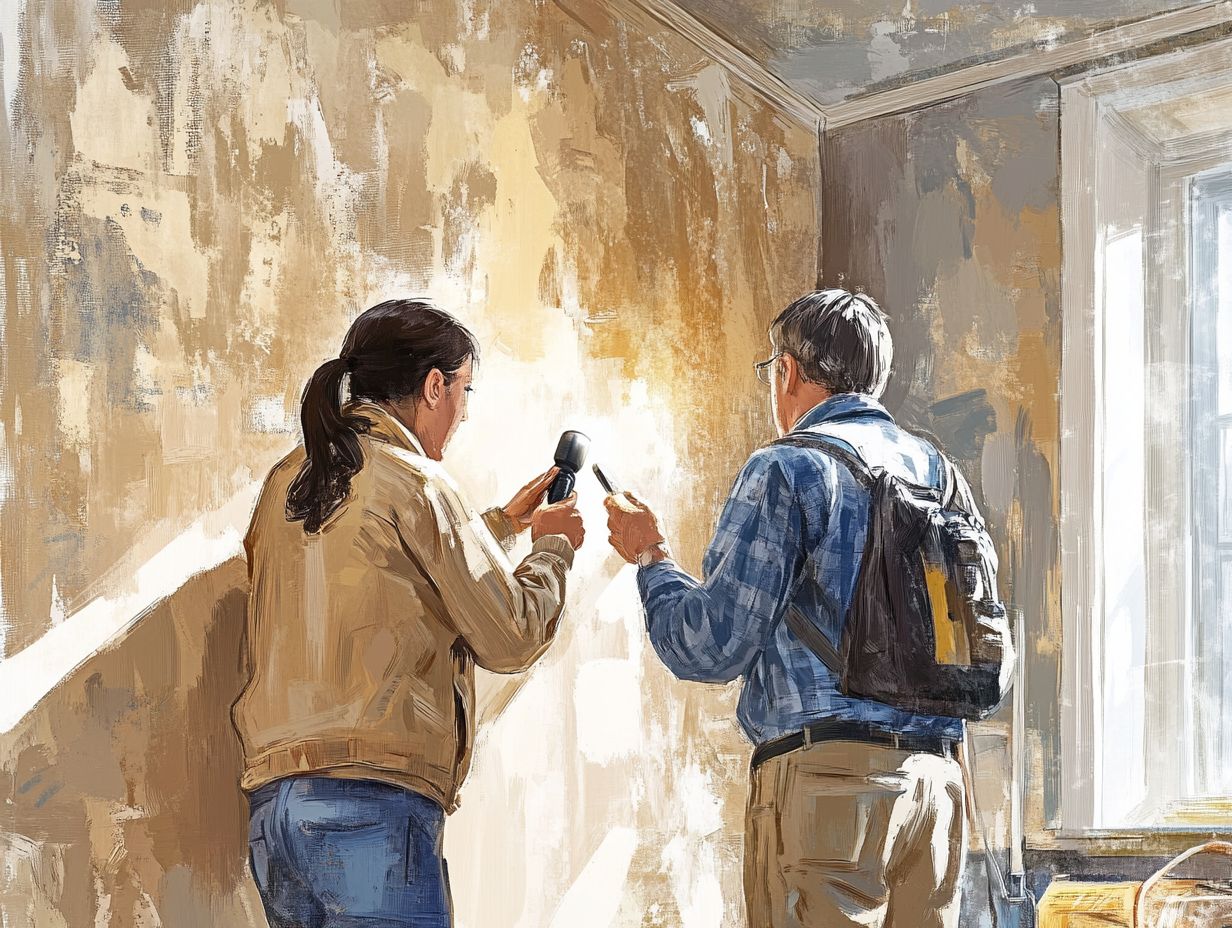
When selecting a home inspector, there are several critical factors to consider. Start with their experience in conducting professional home inspections, keeping an eye on inspection costs, and assessing your specific needs as either a buyer or seller.
It’s vital to evaluate the inspector’s expertise across various types of properties, as different homes can pose unique challenges. For example, an inspector skilled in older homes will know precisely where to look for potential structural issues stemming from aging materials.
Moreover, the clarity and detail of their communication are paramount. A proficient inspector should articulate findings in a way that transcends technical jargon, making it accessible for both buyers and sellers.
This transparency significantly influences a buyer’s ability to make informed decisions and enables sellers to address any potential issues before the sale, ultimately paving the way for a smoother transaction.
Preparing for a Home Inspection
Preparing for a home inspection is essential for you, whether you’re buying or selling. It ensures that everything unfolds seamlessly on inspection day.
By utilizing an inspection checklist, you can proactively address any potential concerns in advance, setting the stage for a successful outcome.
Tips for a Smooth Inspection Process
To ensure a seamless home inspection day, follow essential tips and use an inspection checklist to prepare effectively. Preparing in advance not only reduces stress but can significantly influence the inspection results.
For sellers, this means tackling minor repairs and ensuring cleanliness before the inspector arrives. This helps create a positive first impression.
Buyers should familiarize themselves with common inspection checklists. This allows them to understand what to expect and pinpoint specific concerns they wish to have addressed.
Working together effectively can streamline the process, paving the way for a more transparent and productive negotiation process, ultimately leading to a smoother transaction.
Frequently Asked Questions
What is the purpose of a home inspection?
A home inspection is a crucial step in the home buying process. It aims to identify potential issues or concerns with the property and provides a detailed check of the home’s condition. Understanding what to expect with a home inspection helps buyers make informed decisions before finalizing the purchase.
Who conducts a home inspection?

A certified home inspector, trained in various systems and components of a home, typically conducts the inspection. They are impartial and provide an unbiased evaluation of the property.
What does a home inspection cover?
A standard home inspection typically covers structural components, electrical systems, plumbing, heating and cooling systems, interior and exterior features, and the roof. Buyers can also request additional services, such as pest inspections or radon testing, which checks for a colorless gas that can be harmful.
How long does a home inspection take?
The duration of a home inspection can vary depending on the size, age, and condition of the property. On average, it can take anywhere from 2 to 4 hours. However, larger or older homes may take longer to inspect.
Can I attend the home inspection?
Yes, buyers are encouraged to attend the home inspection. This allows them to ask questions, gain a better understanding of the property, and see potential issues firsthand. However, it is not mandatory, and buyers can opt to receive a written report.
What happens after a home inspection?
After the inspection, the inspector provides a detailed report outlining their findings, including potential issues or recommended repairs. Buyers can then use this information to negotiate with the seller for repairs or credits or to make an informed decision about moving forward with the purchase.
For more information or assistance with home inspections, feel free to reach out!

